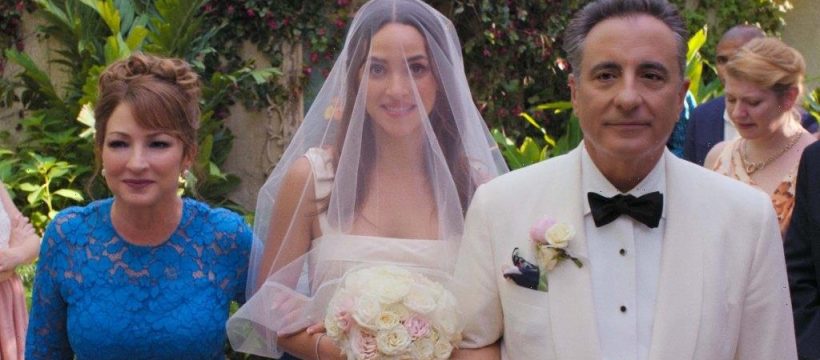The wedding industrial complex has intensified since novelist Edward Streeter wrote his wryly observational satire “Father of the Bride” in 1949. So, too, has the titular patriarch’s panic that his daughter’s nuptials will expose him as a substandard provider. Director Gary Alazraki’s uneven adaptation — the third in seven decades after Spencer Tracy and Steve Martin reached for the migraine medication — casts Andy Garcia as the beleaguered patron whose ego outshines his child’s simpler desires. This remake is loud and exaggerated; it’s more hijinks than heart. (Even the swans that bedeviled Martin have been swapped out for synchronized flamingos.) Audiences looking to shed a tear need not RSVP.
Garcia plays Billy Herrera, a Cuban exile — not immigrant, he stresses — who has built himself an upper-class life in Miami. Decades ago, he scaled the ladder of success from carpenter to architect. That struggle is the bedrock of his personality, and by the fifth time screenwriter Matt Lopez has him bring it up, Billy’s family looks ready to hit him with a hammer. Meanwhile, his wife Ingrid (Gloria Estefan, mellow and empathetic) has decided to tear down their entire marriage. Before the Herreras can announce their divorce, however, their daughter Sofia (Adria Arjona), a workaholic New York lawyer, blindsides her parents with the news that she has a boyfriend named Adan (Diego Boneta). And that she’s marrying him. In one month’s time. Before moving to his home country of Mexico.
“Mexican cigars?!” Billy grumbles. He’s as flexible as a concrete floor, with immovable, slicked-back hair that already makes him look like an out-of-place fossil under the bleachy bright whites of DP Igor Jadue-Lillo’s Florida. Will blonde bobblehead wedding planner Natalie (“SNL’s” Chloe Fineman) brainstorm an event that pleases both the young folks’ dream of a casual zen-yoga vibe and Billy’s demands for a formal Catholic ceremony? Not likely. Nevertheless, she attempts to rally the troops, hollering, “Sí se puede!” It’s a groaner almost as awkward as when Fineman is made to roll her eyes at Garcia and sigh, “Okay, boomer.”
Billy is stubborn and traditional. Everyone else is varying degrees of not. (Upon learning Sofia proposed to Adan, Billy gasps, “Can you do that?”) The only thing anyone can agree on is that they like spending pop’s money — that is, until Adan’s own father Hernan (Pedro Damián), a wealthy beer magnate, arrives from Mexico with his ex-wife (Laura Harring), his new wife (Macarena Achaga), and a yawning checkbook that sends Billy into conniptions. (The original book described the father of the bride as a man “possessed of a doomsday eloquence.” Garcia, alas, is mostly tasked to bully and sulk.)
The jokes are predictable and monotonous. Each scene is the same showdown between traditionalism and modernism, set in a new locale. The one exception is an ambitious four-minute tracking shot on the wedding day that gathers steam as it darts from guest to guest, channeling the manic energy that Alazraki has aspired to throughout the film. Occasionally, the script dips into the culture clash between the Cuban-American and Mexican families. (One fight centers on whether they should be having the fight in English or Spanish.)
But money is central to Billy’s angst, and so it is central here, even as the situations become increasingly unrelatable. (It’s one thing for Billy to be irritated that his family doesn’t like the butternut squash soup at his preferred venue; another to be enraged that Hernan is throwing an engagement party on his superyacht.) Any lingering realism is scuttled by the time the bachelor party tromps to a hot strip club in Miami, home turf for the musicians Rick Ross, DJ Khaled, Flo Rida and Pitbull, only to find dancers gyrating to blues rock, as though the story took a wrong turn and accidentally blundered into a 1980s Dan Ackroyd comedy.
The cast is decent enough. Isabela Merced (“Dora the Explorer”) makes the most of a thinly written part as Billy’s youngest daughter, a wacky, would-be fashion designer. As the engaged couple, Arjona and Boneta grin radiantly and sigh when needed. The film doesn’t care enough about their characters to build any chemistry, but they give good puppy-dog eyes. This is Garcia’s show, and once the script runs out of ways to make him look ridiculous, this great actor is able to lend the film legitimate gravitas just in time for the third act. Still, Estefan dominates most of their scenes simply by playing her neglected wife as a credible human being. Every time she smiles, the film lights up. In all this fuss and nonsense, she’s the strongest argument to believe in love.
Source: Read Full Article
